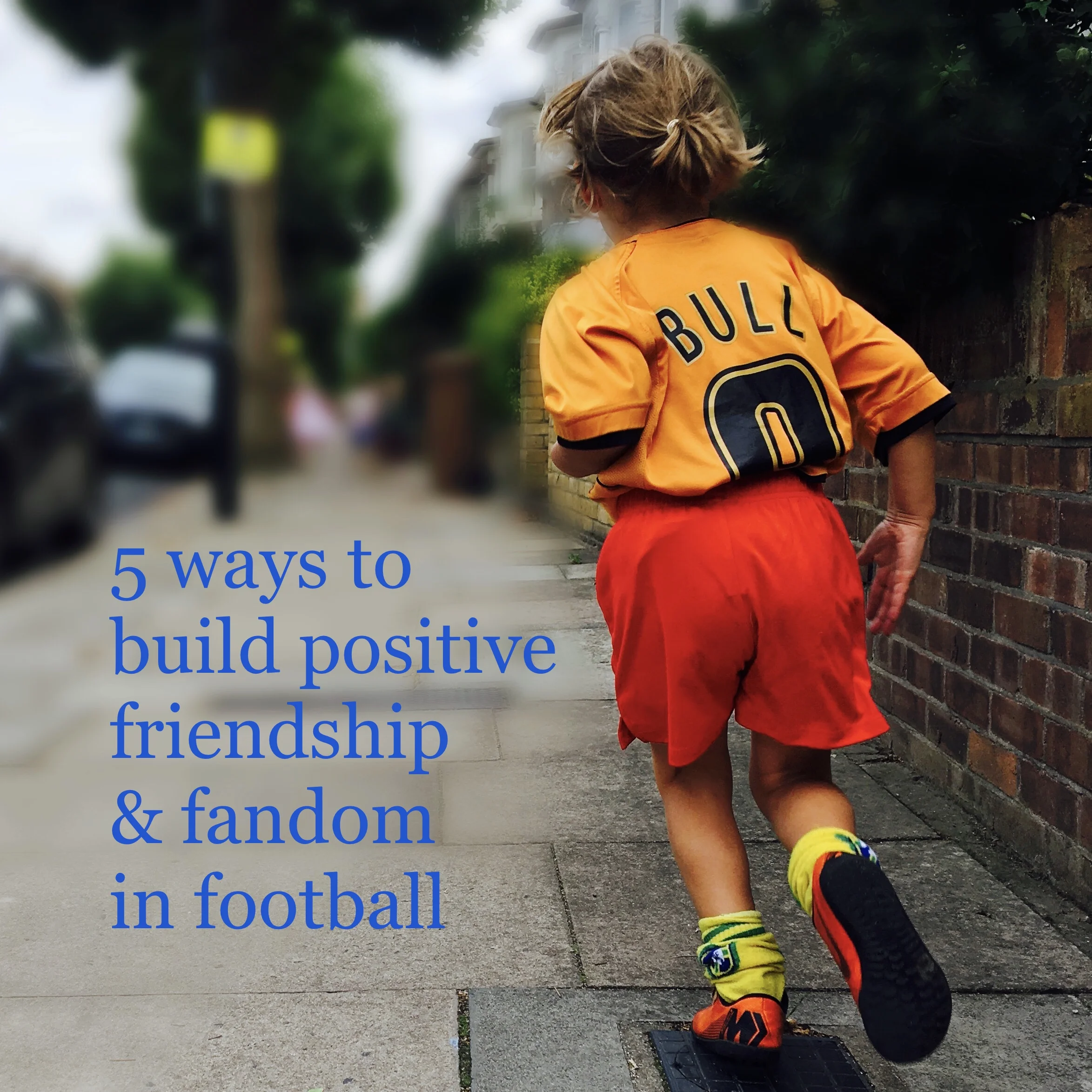When your kid loves football
Football fever was everywhere this summer, from watching a surprisingly successful England men's World Cup team, to long heatwave days in the park kicking a ball around. But football as a sport and a culture has its problems as well as its joys. How do you foster a positive attitude to the sport your kid loves?
I got chatting to a father recently, we were dropping our kids off to play football and hanging around watching. He told me his son is not all that interested in football, but he had made him go to the practice for over a year and the kid was happy doing it now, although he preferred other things. I wondered why he had made him go if there were other things his son preferred. The dad, my new friend, had lived abroad as a child and the children there had all gone skiing instead of playing football. When he returned to the UK aged 9 it was impossible to catch up. All the kids at school played football every lunchtime, and the popular kids were the ones who could play well. It didn’t matter that he was an amazing skier, he was left out.
And this remains true today. Football is the great leveller, if you’re a good player, and if you’re the right gender. It can open the door for boys to friendship, camaraderie, a sense of belonging. Why is football such a massive part of masculine culture, particularly in schools?
Football is like carnival, as a fan you’re allowed to shout, swear, scream, let out all your aggression and sadness with hundreds of others by your side. At its best it’s freedom, it’s expression, it’s movement, it’s being part of a team. At worst, it’s aggressive, violent, intimidating, the pinnacle of the worst side of toxic masculinity.
But historically what else has there been for men? What if there’s no other time you can hug your mates? It’s allowed if you’re on the pitch, or if you’re celebrating a goal in the crowd. What if you’re flooded with emotion that you can never talk about because you’re terrified of being seen as weak? What if everything from rage to love is stuck inside you, unexpressed, unacknowledged? Suddenly, screaming your head off at the pitch becomes a necessity.
“What if everything from rage to love is stuck inside you, unexpressed, unacknowledged? Suddenly, screaming your head off at the pitch becomes a necessity.”
It’s a powerful part of male bonding in many situations, the guy I met pitch side knows that. The two men I talk to who tell me they 'keep up with the scores so they’ve always got something in their pocket to chat about' understand that it’s a shortcut to male friendship. That’s not necessarily a bad thing, but it is narrow and often it excludes women who have not spent their formative years on the pitch or watching games. It even excludes those who have.
A woman I know very well is an excellent footballer. She still plays for a team now in her thirties. I asked her about her experiences as a lifelong fan and player:
'All I wanted to do was play football growing up, but it wasn’t something girls did, there was no opportunity to play at my school – I remember practically begging for a girls’ team only to be turned down by the PE teachers. At lunch-time I would sit quietly with the girls rather than be ridiculed for playing with the boys. When I did play with them out of school I still remember the shameful taunts of "you were tackled by a girl" and being called a tomboy and lesbian just because I liked this sport.'
The current culture around football sends the message that it’s not for women. There are no women on Match of the Day and few in the stands. Rare female commentators and referees face sexist criticism and abuse. There are plenty of women who love to play and watch football but they’re invisible. It’s unlikely that in a vacuum only men would like the game. It’s just that we have created another tight, binary box based on gender alone, and we continue to maintain it. Women’s football has come a long way, especially in terms of popularity and availability, it’s even shown on TV now. But we all need to accept that gender isn’t the precursor to enjoyment or talent in any sport.
My kids adore football, which is great, but I don’t want them to get caught in the web of stereotypical male behaviour that it so often promotes.
So how to show them that the prevailing culture can and will change?
1. Share a love of sports, not just of football
Show them a variety of sports, so that if football is the dominant game at their school, they are aware that it is not like that everywhere. It lowers the stakes, regardless of their ability and passion for the game. This is relevant for all sports, whether the favoured trend is gymnastics or rugby – opening up the world for them lets them see that they don’t have to be like everybody else and nor do their peers. “There is space here for everyone.”
2. Make space to let it out
Let boys and girls express their feelings, little and big. Give them the tools to talk about their own emotions, so they don’t need to riot to let them go. “Are you shouting because you feel angry?”
3. Show all the players
Whatever sport they fall in love with, show them images or footage of all genders playing brilliantly. “Boys and girls are so great at this.”
4. Let them choose
Accept that the sport they love may be something you do not enjoy. Don’t try to turn them away from whatever they’ve connected with. Allow them the freedom to play and be passionate about their chosen game, regardless of their gender and your adult opinions. Sport can be very simple for kids. Without the drag of cultural expectations around their shoulders they’ll be free to have fun.
5. Challenge them
Listen to your children and tackle any comments that reinforce stereotypes. Let them see that sport (and life) can be more diverse than what we’re often spoon fed.










